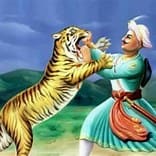Table of contents

Tipu Sultan played a HEROIC Role in the Independence of India with the British he also known as the Tiger of Mysore, was a legendary ruler and military strategist who reigned over the Kingdom of Mysore in southern India during the late 18th century. Born on November 20, 1750, in Devanahalli, Karnataka, Tipu Sultan was the eldest son of Sultan Hyder Ali, the ruler of Mysore. From a young age, he displayed exceptional military prowess and leadership qualities that would shape his legacy.
Early Life and Ascendancy:
Tipu Sultan’s education was diverse and comprehensive. He received training in military tactics, language, and administration, as well as exposure to different cultures and religions. When his father Hyder Ali passed away in 1782, Tipu Sultan assumed the throne and embarked on a series of military campaigns to defend and expand his kingdom’s territories.

Military Campaigns and Resistance against the British:
One of Tipu Sultan’s most significant challenges was the encroachment of the British East India Company. Determined to preserve his sovereignty, he waged relentless wars against the British forces. Tipu Sultan formed alliances with other regional powers to resist British expansionism. Notably, he formed diplomatic relations with the French, who were also adversaries of the British in India.
Tipu Sultan’s military campaigns were marked by his innovative tactics and the effective use of modern weaponry. He introduced the use of rockets, known as “Mysorean rockets,” which startled and demoralized the British troops. The legendary Battle of Pollilur in 1780 showcased his military genius, as his forces inflicted a significant defeat on the British.
Despite facing immense pressure from the British, Tipu Sultan remained a fierce opponent. He fought in multiple wars, including the four Anglo-Mysore Wars, with each conflict testing his determination and resilience. However, despite his strategic brilliance, he faced setbacks and territorial losses, eventually leading to the fall of his kingdom.
Contributions and Legacy: Beyond his military achievements, Tipu Sultan was a visionary ruler who implemented various reforms and policies. He modernized the administration, introduced innovative technologies, promoted trade, and implemented agricultural reforms. He showed a keen interest in science, art, and culture, patronizing scholars, artists, and architects.

Tipu Sultan’s commitment to secularism was noteworthy. He ensured religious tolerance and appointed individuals from diverse backgrounds to key administrative positions. He was known for his respect for other faiths and even issued coins bearing inscriptions in different languages.
Conclusion: Tipu Sultan’s life was tragically cut short on May 4, 1799, during the Siege of Srirangapatnam when his capital was captured by the British. His Death marked the end of an era and the beginning of British dominance in the region. However, his indomitable spirit and his fierce resistance against colonial powers have left an enduring legacy. Tipu Sultan continues to be celebrated as a symbol of bravery, patriotism, and resistance in the annals of Indian History.
If you like this story make sure to check out the story Of The Great Maratha Warrior
